8 books about Pneumatology
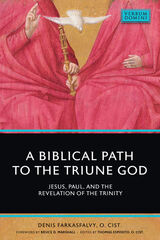
A Biblical Path to the Triune God
Jesus, Paul and the Revelation of the Trinity
Denis Farkasfalvy
Catholic University of America Press, 2021
This short volume, finished just before Denis Farkasfalvy’s death in 2020, serves effectively as his last theological testament. Throughout his scholarly career, Farkasfalvy aimed to reconcile and unite theological disciplines that had increasingly become isolated from each other, most notably the biblical, patristic, and systematic. In A Biblical Path to the Triune God, the Cistercian abbot identifies the earliest biblical witnesses to the Church’s teaching about God, formulated at the Council of Nicaea, as Father, Son, and Holy Spirit.
Jesus’ famous praise of the Father, found almost word-for-word in Matthew 11:25-27 and Luke 10:21-22, is Farkasfalvy’s point of departure for his bold assertion that in the earliest sources, we find abundant evidence that “it was not Jesus who revealed his own divine sonship; rather, the Father revealed it to those whom Jesus had chosen and were open to respond in faith.” Farkasfalvy demonstrates that Jesus reveals his relationship to the Father in terms of intimate and experiential knowledge, transforming the procreative metaphor of filiation from the physical (as in the Psalms and 2 Samuel 7) to the epistemological realm of knowledge, what he calls “love within cognitive dimensions.” Just decades after Jesus’ ministry, numerous independent apostolic witnesses, from the Synoptic Gospels and John to Paul (especially Romans 1:1-4 and Galatians 1:15-16), indicate a robust and widespread understanding of the Father’s self-disclosure in Jesus the Son.
Farkasfalvy concludes his brief but intense reflection by outlining how a single organic process of revelation binds together the Father and the Son, and then extends that loving communion to believers in the Spirit, a communion made possible only by the incarnate Son’s crucifixion and subsequent glorification. This book accomplishes the admirable feat of showing that far from being the invention of later centuries, the Trinitarian doctrine of the Church is firmly rooted in the very first reflections on Jesus’ ministry and mystery by the biblical authors.
[more]
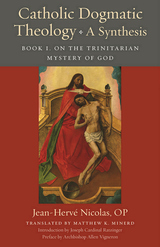
Catholic Dogmatic Theology
A Synthesis: Book 1, On the Trinitarian Mystery of God
Jean Herve Nicolas, OP
Catholic University of America Press, 2021
Every discipline, including theology, requires a synthetic overview of its acquisitions and open questions, a kind of “topography” to guide the new student and refresh the gaze of specialists. In his Synthèse dogmatique, Fr. Jean-Hervé Nicolas, OP (1910-2001) presents just such a map of Thomistic theology, focusing on the central topics of Dogmatic Theology: The One and Triune God, Christology, Mariology, Ecclesiology, the Sacraments, and the Last Things. Drawing on decades of research and teaching, Fr. Nicolas synthetically presents these topics from a faithfully Thomistic perspective. While broadly and genially engaging the theological literature of the 20th century, he nonetheless remains deeply indebted to the Thomistic school that would have formed him in his youth as a theologian. This provides the reader with an unparalleled theological vision, masterfully bringing forth, at once, what is new and what is classical.
Catholic Theology: A Dogmatic Synthesis will be published in English as a multi-volume work. In this volume, Fr. Nicolas discusses the nature of theological science and the mystery of the Triune God. At once historically-informed and speculatively-detailed, this volume carefully introduces the reader to classical Thomistic positions concerning the theological articulation of the Trinitarian mystery, including the topic of the divine missions, that is, the sending of the Son and the Spirit in the economy of salvation, thereby providing an important connection between the dogmatic portion of theology and its spiritual / moral concerns. Given the central luminosity of the Trinitarian mystery in the life of faith and in theology, this volume is a pivotal chapter in theological reflection. Indeed, objectively speaking, it is the most important discussion in all of theology.
Serving as a professor for decades, including at the University of Fribourg, Fr. Nicolas was at once a profound scholar and a masterful pedagogue. Gathering the work of a lifetime into a single pedagogical narrative, Fr. Nicolas’s Catholic Theology: A Dogmatic Synthesis provides a resource for students and scholars alike. In view of the hyper-specialization of theology today, this series of volumes provides readers with a synthetic and sapiential overview of the fundamentals of dogmatic theology from a robust and profound Thomistic perspective.
[more]
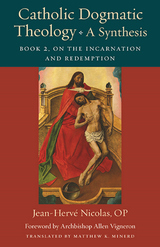
Catholic Dogmatic Theology
A Synthesis: Book 2: On the Incarnation and Redemption
Jean-Herve Nicolas
Catholic University of America Press, 2022
Every discipline, including theology, requires a synthetic overview of its acquisitions and open questions, a kind of "topography" to guide the new student and refresh the gaze of specialists. In his Synthèse dogmatique, Fr. Jean-Hervé Nicolas, OP (1910-2001) presents just such a map of Thomistic theology, focusing on the central topics of Dogmatic Theology: The One and Triune God, Christology, Mariology, Ecclesiology, the Sacraments, and the Last Things. Drawing on decades of research and teaching, Fr. Nicolas synthetically presents these topics from a faithfully Thomistic perspective. While broadly and genially engaging the theological literature of the 20th century, he nonetheless remains deeply indebted to the Thomistic school that would have formed him in his youth as a theologian. This provides the reader with an unparalleled theological vision, masterfully bringing forth, at once, what is new and what is classical.
Catholic Theology: A Dogmatic Synthesis will be published in English as a multi-volume work. In this volume, Fr. Nicolas discusses the mysteries of faith directly connected with the Redemptive Incarnation: the formation of orthodox Christological dogma in the course of the first centuries of the Church; the nature of the Hypostatic Union; the latter's effects in Christ's holiness, knowledge, and incarnate activity; the mariological mysteries connected to the divine maternity; the soteriological meaning of Christ's vicarious satisfaction; and the eschatological return of Christ in Glory.
Serving as a professor for decades, including at the University of Fribourg, Fr. Nicolas was at once a profound scholar and a masterful pedagogue. Gathering the work of a lifetime into a single pedagogical narrative, Fr. Nicolas's Catholic Theology: A Dogmatic Synthesis provides a resource for students and scholars alike. In view of the hyper-specialization of theology today, this series of volumes provides readers with a synthetic and sapiential overview of the fundamentals of dogmatic theology from a robust and profound Thomistic perspective.
[more]
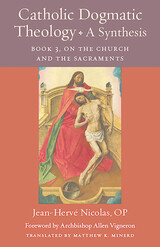
Catholic Dogmatic Theology
A Synthesis, Book 3: On the Church and the Sacraments
Jean-Herve Nicolas
Catholic University of America Press, 2024
Every discipline, including theology, requires a synthetic overview of its acquisitions and open questions, a kind of "topography" to guide the new student and refresh the gaze of specialists. In his Synthèse dogmatique, Fr. Jean-Hervé Nicolas, OP (1910-2001) presents just such a map of Thomistic theology, focusing on the central topics of Dogmatic Theology: The One and Triune God, Christology, Mariology, Ecclesiology, the Sacraments, and the Last Things. Drawing on decades of research and teaching, Fr. Nicolas synthetically presents these topics from a faithfully Thomistic perspective. While broadly and genially engaging the theological literature of the 20th century, he nonetheless remains deeply indebted to the Thomistic school that would have formed him in his youth as a theologian. This provides the reader with an unparalleled theological vision, masterfully bringing forth, at once, what is new and what is classical.
Catholic Theology: A Dogmatic Synthesis is being published in English as a multi-volume work. In this volume, Fr. Nicolas takes up the raison d’être for the mission of the Holy Spirit: the work of sanctification in and through the Church, the mystical body of Christ and sacrament of salvation. In the ecclesiology articulated in this volume, he presents a theology of the Church that is at once wholly Thomistic and also faithful to the great themes of the Second Vatican Council, drawing especially from the works of Journet, Congar, and Bouyer, in critical dialogue with other theologians of his day. He then presents a complete and detailed sacramental theology, both concerning the nature of the sacraments in general, as well as concerning each sacrament in particular, carefully striving to balance positive and scholastic theology.
Serving as a professor for decades, including at the University of Fribourg, Fr. Nicolas was at once a profound scholar and a masterful pedagogue. Gathering the work of a lifetime into a single pedagogical narrative, Fr. Nicolas's Catholic Theology: A Dogmatic Synthesis provides a resource for students and scholars alike. In view of the hyper-specialization of theology today, this series of volumes provides readers with a synthetic and sapiential overview of the fundamentals of dogmatic theology from a robust and profound Thomistic perspective.
[more]
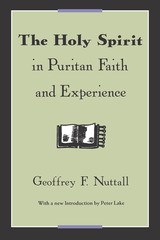
The Holy Spirit in Puritan Faith and Experience
Geoffrey F. Nuttall
University of Chicago Press, 1992
Geoffrey F. Nuttall establishes the primacy of the doctrines of the Holy Spirit in seventeenth-century English Puritanism and demonstrates the continuity of the Reformation tradition from the more conservative views of Luther to the more radical interpretations of the Quakers. Nuttall illuminates prominent spokesmen, including Richard Sibbes, Richard Baxter, John Owen, Walter Cradock, Morgan Llwyd, and George Fox.
In a new Introduction, Peter Lake discusses the relevance of Nuttall's book to, and its influence on, major works in seventeenth-century English history written since 1946.
In a new Introduction, Peter Lake discusses the relevance of Nuttall's book to, and its influence on, major works in seventeenth-century English history written since 1946.
[more]
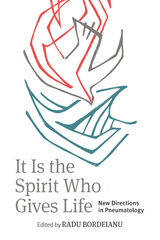
It is the Spirit Who Gives Life
New Directions in Pneumatology
Radu Bordeianu
Catholic University of America Press, 2022
Who is the Holy Spirit? What is the Holy Spirit? The answers to these questions were so obvious in the first centuries of Christian history, that the New Testament and the earliest Christian writers did not feel the need to deliberately address the identity of the Spirit. The more stringent question was this: what does the Spirit do in the Hebrew Scriptures, in the life of Jesus, in the community of disciples, in the Church, and in the world? These same questions, however, did not have the same obvious answers to subsequent generations.
Writing in the fourth century, Gregory of Nazianzus observed a slow progress of better understanding the identity and mission of the Holy Spirit throughout the centuries; his opponents still referred to the Spirit as a “strange,” “unscriptural,” and “interpolated” God (Or. 31). One would expect that today, centuries later, pneumatology would be exponentially further developed than in the patristic era. And yet, contemporary theology only rarely asks who the Spirit is and what the Spirit does. That is where the present volume attempts to bring a contribution, by addressing early Pneumatologies reflected in the Scriptures and the age of the martyrs, historical developments in patristic literature and spiritual writings, and contemporary pneumatological themes, as they relate to ecumenism, ecology, science, ecclesiology, and missions.
The present volume gathers essays authored by eleven world-renowned theologians. Each contribution originated as a public lecture addressed to theologians and an educated general audience, followed by a private colloquium in which the lecturers conferred with scholars who are experts in the field. Thus, the present volume offers a multifaceted approach to Pneumatology, in an ecumenical spirit.
[more]
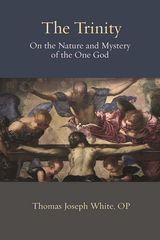
The Trinity
On the Nature and Mystery of the One God
Thomas Joseph White, OP
Catholic University of America Press, 2021
The Trinity is the central mystery of the Christian faith. What can we say about the divine nature, and what does it mean to say that God is Father, Son, Holy Spirit, three persons who are one in being? In this book, best selling author Thomas Joseph White, OP, examines the development of early Christian reflection on the Trinity, arguing that essential contributions of Patristic theology are preserved and expanded in the thought of Thomas Aquinas.
By focusing on Aquinas’ theology of the divine nature as well as his treatment of divine personhood, White explores in depth the mystery of Trinitarian monotheism. The Trinity: On the Nature and Mystery of the One God also engages with influential proposals of modern theologians on major topics such as Trinitarian creation, Incarnation and crucifixion, and presents creative engagements with these topics. Ultimately any theology of the cross is also a theology of the Trinity, and this book seeks to illustrate how the human life, death, and resurrection of Jesus reveal the inner life of God as Trinity.
[more]
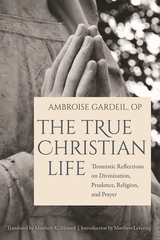
The True Christian Life
Thomistic Reflections on Divinization, Prudence, Religion, and Prayer
Ambroise Gardeil, OP
Catholic University of America Press, 2022
Although not well-known in the English-speaking world, Fr. Ambroise Gardeil, OP (1859-1931) was a Dominican of significant influence in French Catholic thought at the turn of the 20th century. Conservative theologians like Frs. Reginald Garrigou-Lagrange, OP, Michel Labourdette, OP, Jean-Hervé Nicolas, OP and many others hailed him as a careful expositor of the supernaturality of faith, a defender of the theological nature of rational apologetics, and a spiritual master. In his controversial Le Saulchoir: Une école de théologie, Fr. Marie-Dominique Chenu, OP praised Fr. Gardeil as an important Dominican initiator of reforms in historical theology, presenting the latter as a kind of precursor to one of the streams of what is now referred to historically as the “Nouvelle Théologie.” And one cannot read the words of Fr. Gardeil’s contemporary Fr. Antoine Lemonnyer, OP, without hearing echoes and re-echoes of common cause regarding our lofty spiritual vocation, resounding within the halls of the Saulchoir. With such a broad appeal, it is no surprise that in private correspondence, a young Yves Simon, writing to Jacques Maritain, referred to Fr. Gardeil as “The Great Gardeil.”
The True Christian Life provides a thorough and stirring introduction to Fr. Gardeil’s work in spiritual theology. The volume was originally published posthumously through the collaboration of Fr. Gardeil’s nephew, Fr. Henri-Dominique Gardeil, OP and Jacques Maritain. Fr. Ambroise, prior to beginning work on his masterpiece on spiritual experience, La Structure de l'âme et l'expérience mystique, drafted nearly eight-hundred pages that would have set forth a full presentation of moral-ascetical theology. While drafting this massive work, his reflection on the soul’s receptive capacity for grace led him to the two-volume study, La Structure, and he never was able to finish his original designs for a comprehensive study of the Christian moral-spiritual life. Soon after his death, his nephew gathered several essays from the Revue thomiste and Revue de Jeunes, along with a complete-but-unpublished study on prayer. Drafting a lengthy introduction on the basis of Fr. Ambroise’s unpublished notes, Fr. Henri-Dominique assembled a volume of moral / spiritual theology that sets out the principles of many important themes: divinization through grace, Christian prudence /conscience, the virtue of religion, devotion, and prayer.
In his In memoriam written after the passing of Fr. Gardeil, Fr. Reginald Garrigou-Lagrange emphasized Fr. Gardeil’s ability to meditate on a given topic’s central principles, like someone who sees the highest peaks that give structure to the entire mountain range of theology. In this volume, the reader will find a clear and rhetorically striking presentation of the central mysteries of the spiritual life, presented with stirring and beautiful rhetoric by a theological master from the Thomist tradition.
[more]
READERS
Browse our collection.
PUBLISHERS
See BiblioVault's publisher services.
STUDENT SERVICES
Files for college accessibility offices.
UChicago Accessibility Resources
home | accessibility | search | about | contact us
BiblioVault ® 2001 - 2024
The University of Chicago Press









